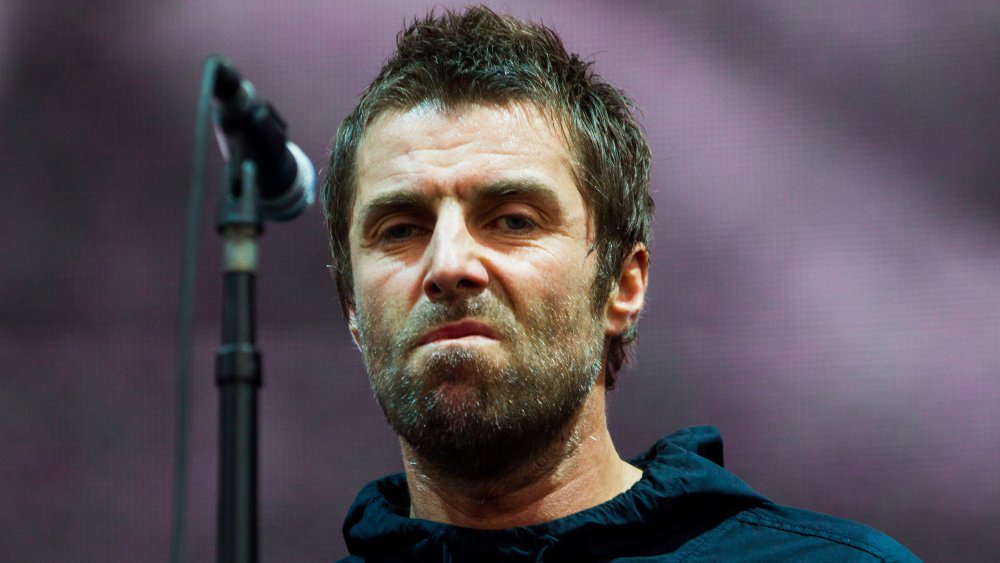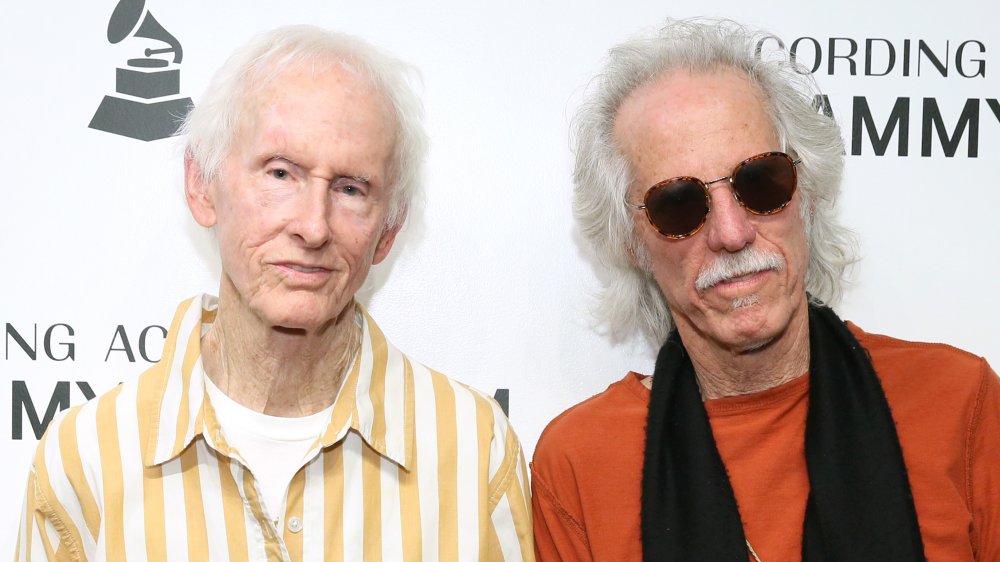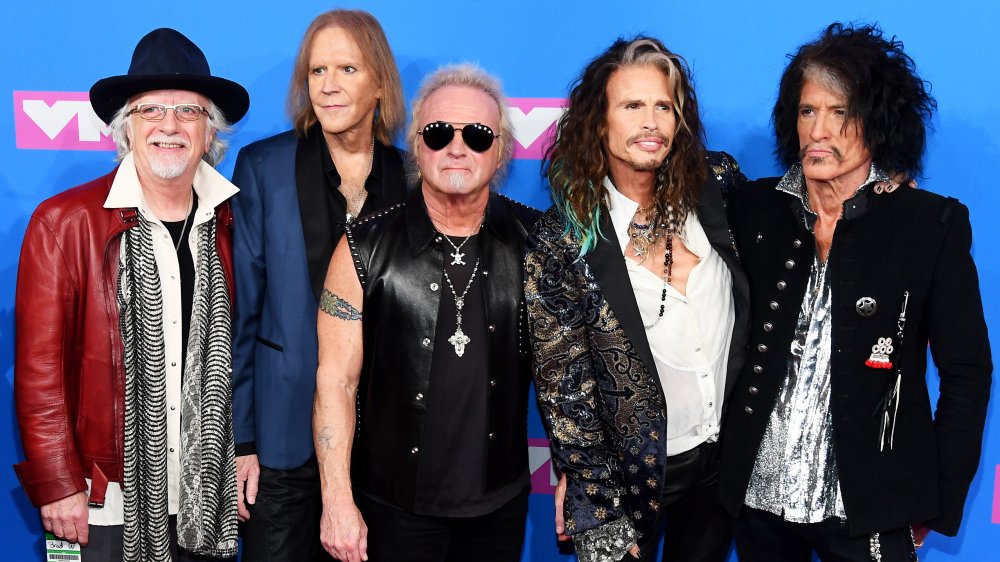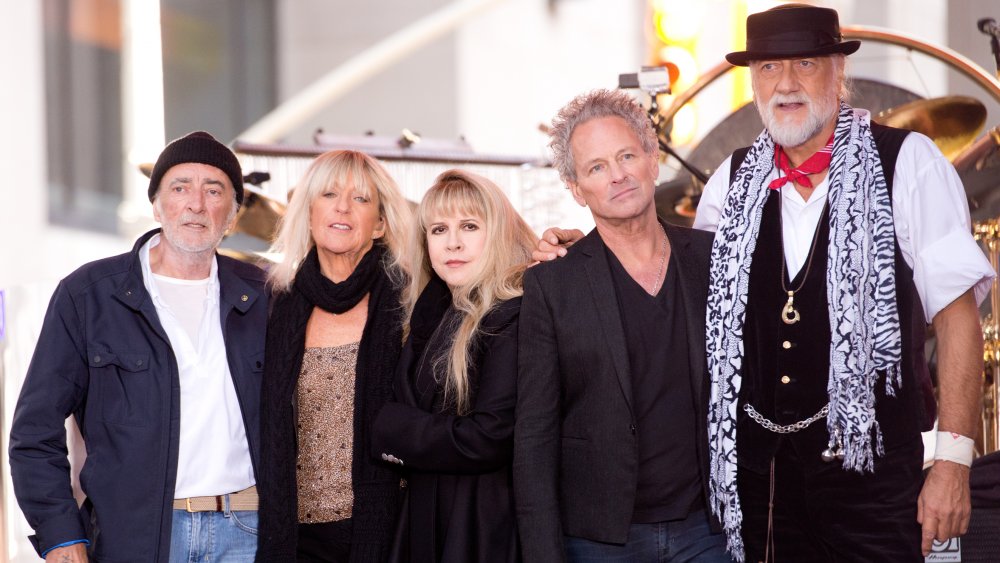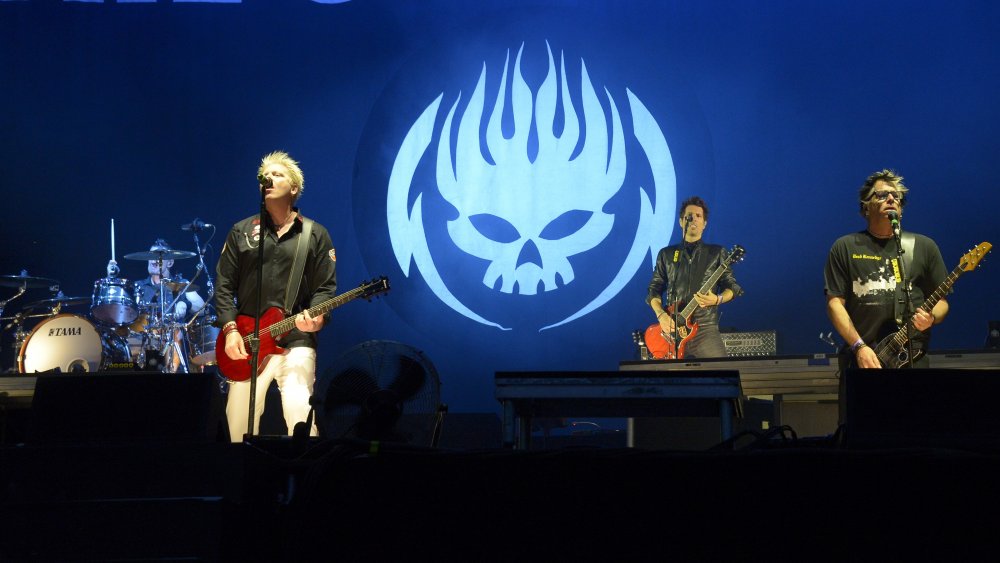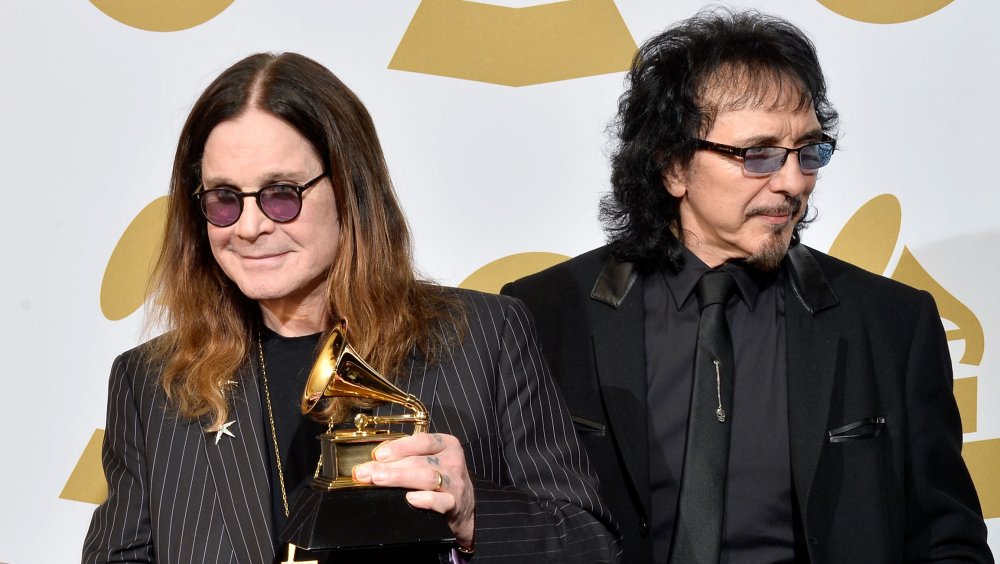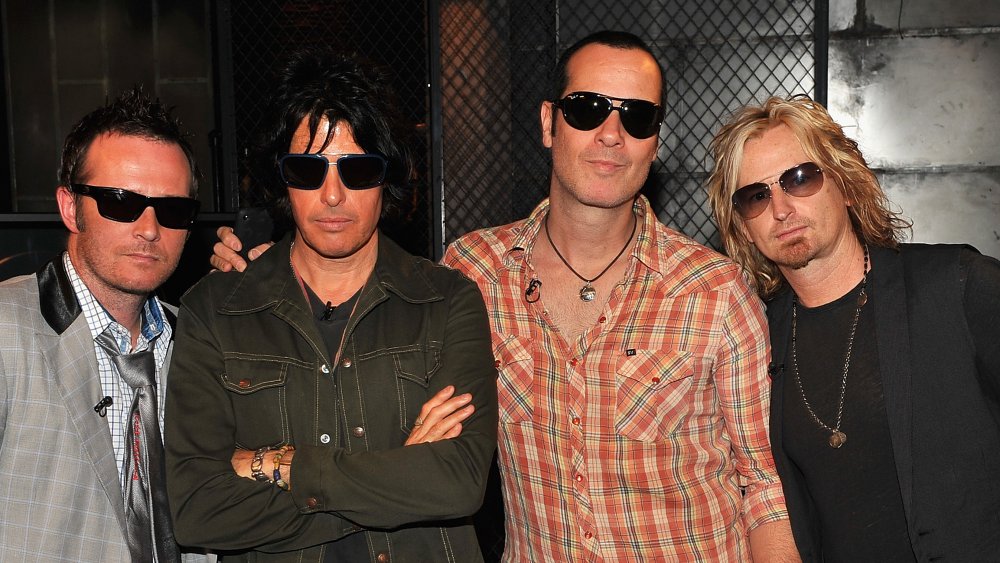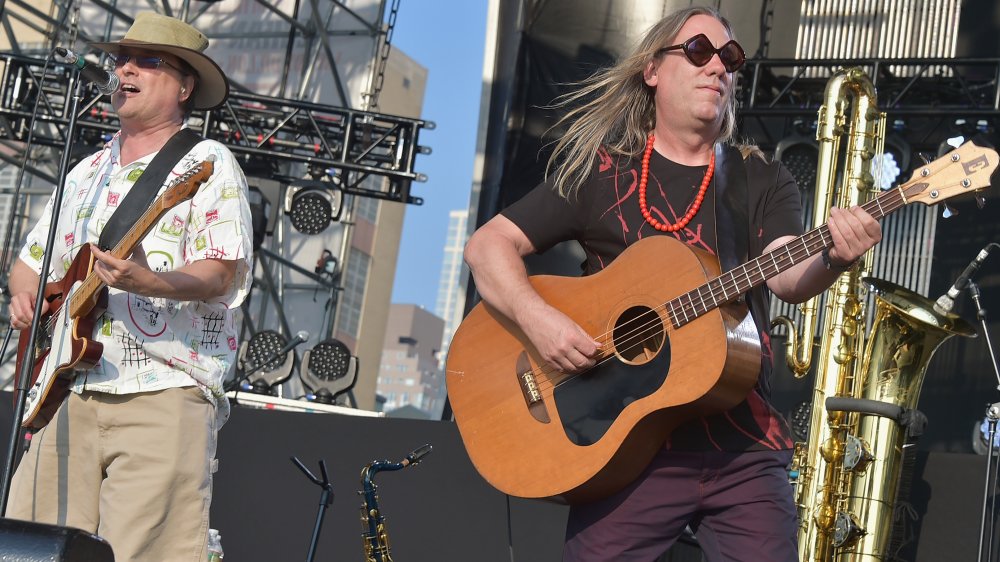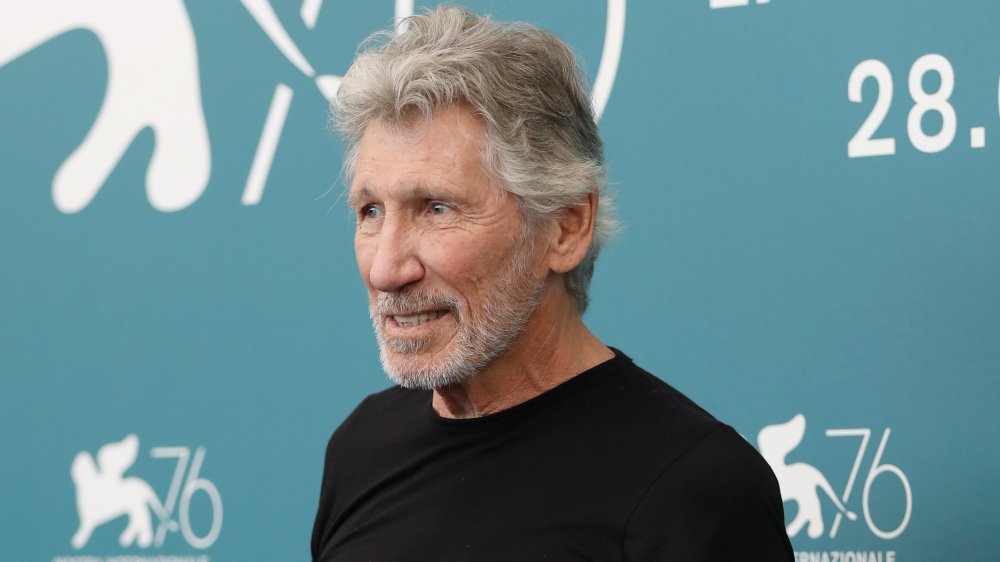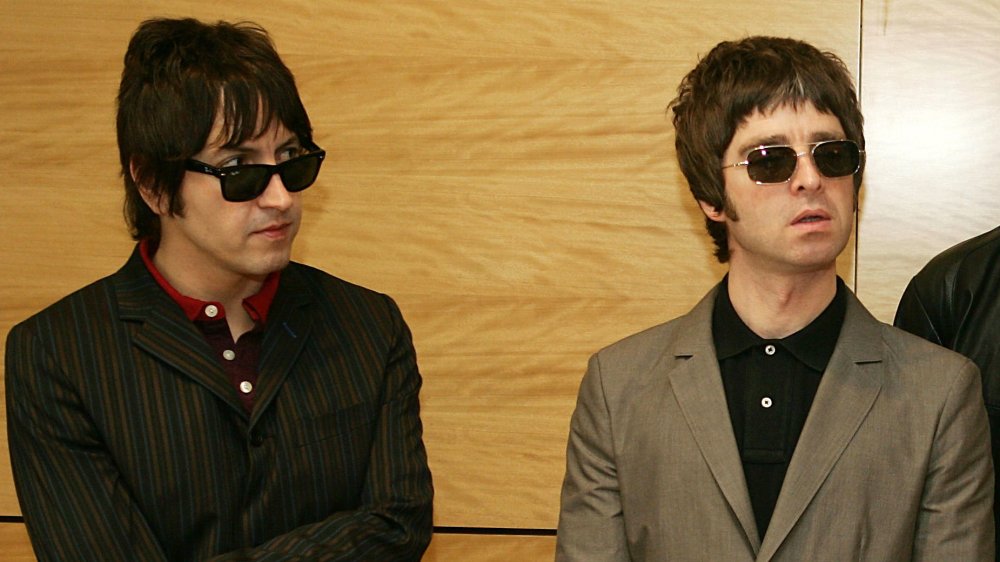The Most Petty Lawsuits Band Members Have Ever Filed Against Each Other
Fame brings many things — money, accolades, the end of any semblance of privacy, and so on. As a result, celebrities find themselves thrust into a world governed by superficiality, so perhaps it's no surprise when unbelievably petty disputes arise. The music industry has seen plenty of such strife, not to mention a steady string of litigation.
And when the over-the-top glitz and glamour of the music world collides with the stolid realm of the courtroom, it's a messy sight — albeit one that has been seen time and again. Artists accuse each other of plagiarism, especially when a hit song starts raining money, and individual band members, frequently fueled by massive egos, will fight each other over just about anything (but usually money). You might think having mountains of wealth would leave these people at ease on financial matters, but that doesn't seem to be the case. Here are some of the silliest lawsuits that band members have ever filed against each other.
Things got incredibly petty with the Doors
In 2003, John Densmore, drummer of the Doors, discovered that the band's guitarist, Robby Krieger, and its keyboardist, Ray Manzarek, had joined with former Cult frontman Ian Astbury and were performing as the Doors of the 21st Century. The Hollywood Reporter notes that concert promos featured the word "Doors" in big, bold letters, whereas "of the 21st Century" was in considerably tinier print. On top of that, their concerts featured generous helpings of the late Jim Morrison's image.
By the end of their tour, the Doors of the 21st Century had made $3.2 million, all of which went to their imaginatively named business, Doors Touring, Inc. Densmore, along with Morrison's estate, sued Manzarek and Krieger to get them to cease using the Doors' name in their concerts. The duo countersued, accusing Densmore and Morrison's estate of preventing them from profiting as musicians. (Densmore had recently vetoed a $15 million advertising deal from Cadillac, which Kreiger and Manzarek had wanted to take.)
According to Rolling Stone, Manzarek and Krieger's lawyers trashed Densmore in court as both an eco-terrorist and a communist. On the flipside, numerous big-name musicians testified in support of Densmore. Finally, Manzarek and Krieger were ordered to pay $3.2 million to Densmore and Morrion's estate, plus $2 million in legal fees. After their subsequent odyssey of appeals ended in 2008 when the California Supreme Court refused to hear the case, they continued to perform Doors songs as Riders on the Storm.
The drummer of Aerosmith filed a lawsuit against his own band
Iconic rock band Aerosmith had quite a gig in January 2020, namely playing at the Grammy Awards. There was just one problem, though. The drummer, Joey Kramer, had suffered an ankle injury in 2019 and hadn't been able to perform with the band for a while. Now, Kramer was ready to return, and he was quite eager to play at the Grammys. But then the other members of Aerosmith wouldn't let him.
The reason depends on who you ask. According to Kramer, as detailed by Boston.com, the band set ridiculous, ever-changing standards for him to rejoin, and he was reportedly told that his drum-playing didn't have enough "energy." Aerosmith's side of the story is that Kramer waited until the last minute to accept an invitation from them to play at the Grammys, and there was simply no time to rehearse with him. It probably didn't help matters when Kramer sued Aerosmith a mere nine days before the awards, seeking a court order to let him play at the Grammys and subsequent gigs. Five days after Kramer filed the suit, the Associated Press reported that a judge had declined to oblige him.
The drama never ends with Fleetwood Mac
In January 2018, Lindsey Buckingham, lead guitarist of Fleetwood Mac, received some unexpected news: The band was going on tour that year without him. They'd all played together at Radio City Music Hall only a few days beforehand, so what gave? The other band members reportedly wouldn't return Buckingham's calls, leaving the answer elusive, but he had an idea why.
According to The Hollywood Reporter, he'd asked for the 2018 tour's start date to be pushed from August to November so he could release his solo album and perform the requisite promotional duties. The band wouldn't budge on the start date, so Buckingham delayed his album. Since Fleetwood Mac would only be performing three nights a week on their tour, though, Buckingham asked that he be allowed to do solo shows on the off nights. Instead, he got the boot.
Buckingham sued the rest of the band in October 2018, seeking the $12 million he would have made from the tour on the grounds that he was still willing and able to perform with them. Fleetwood Mac denied Buckingham's allegations, retained their own attorney, and stated that they looked forward to their court date. Perhaps they shouldn't have been so confident. The suit was settled in December. While the terms of the settlement weren't disclosed, Buckingham told Billboard that he was happy with the outcome.
When the members of the Offspring went to war with each other
In 2019, former Offspring bass player Gregory "Greg K." Kriesel sued his old band, alleging that he'd been the victim of a "scheme" to kick him out and deny him his rightful revenue. As reported by Forbes, Kriesel had been asked to leave the previous year. In his suit, the bass player argued that he was nonetheless entitled to a cut of the Offspring's profits made after he left, citing an oral agreement of partnership made in 1986 between him, Bryan "Dexter" Holland, and Kevin "Noodles" Wasserman. Kriesel wanted compensation, ten percent interest, punitive damages, and an audit of the band's income before and after he left.
Holland and Wasserman promptly filed a cross-complaint, fomenting a quagmire of hearsay and accountants. They stated that no partnership requires all parties to be bound to it for all time and pointed out that when another former member, Ron Welty, left the Offspring in 2003, Kriesel himself felt that Welty should only get royalties from the albums released while he was part of the group. In addition, they asked for three impartial appraisers to determine the actual value of Kriesel's stake in the Offspring. Holland and Wasserman also claimed that they'd attempted to negotiate financial matters with Kriesel upon his departure, but Kriesel simply called off the talks and sprang right to suing. As of this writing, there's been no word on the outcome of the lawsuits.
The truth behind the Live lawsuit
Ed Kowalczyk, former frontman of 1990s alt-rock gods Live, left the group in 2009, after which a new vocalist took over. Kowalczyk continued his career solo, releasing an album titled Alive, and being the former singer of Live, he purportedly performed gigs as "Ed Kowalczyk of Live." As The Hollywood Reporter tells it, the other members of his old band weren't pleased.
In 2012, guitarist Chad Taylor, bassist Patrick Dahlheimer, and drummer Chad Gracey sued Kowalczyk through their company, Action Front United. They felt that Kowalczyk billing himself as "of Live" created the false impression that he was still part of the band and that Live endorsed Kowalczyk's music. The trio demanded $2 million in damages, as well as a court order that Kowalczyk not mention the band as part of his solo act. According to Lexology, Kowalczyk countersued his former bandmates. In the end, though, the hatchet was buried. The dispute was settled in 2013, and as of 2017, Kowalczyk was performing with Live again.
Grand Funk Railroad and criminal capitalization
In 2018, as reported by MLive.com, Don Brewer and Mel Schacher of Grand Funk Railroad sued a former member of their band, Mark Farner. Brewer and Schacher alleged that the way Farner billed himself in his solo acts violated a 2004 injunction that very specifically defined what Farner could and couldn't do when it came to referencing Grand Funk Railroad or its well-known songs. The meat of the problem was that, simply put, Farner had employed improper capitalization in his promotional materials.
The injunction had several stipulations. First, Farner's name had to appear in capital letters before any mention of Grand Funk Railroad. Conversely, only the first letters of "Grand Funk Railroad" were to be capitalized, and the words "member," "former," and "formerly" also had to be capitalized. Farner allegedly violated the rules seven times, such as by performing as "Mark Farner formerly from Grand Funk Railroad."
Capitalization aside, Farner had also performed as "Mark Farner's American Band," which shares a similar name to the GFR song "We're an American Band." As a result, Brewer and Schacher's suit argued that Farner's actions would cause Grand Funk Railroad "irreparable harm" and sought to bar Farner from using GFR's name or the phrase "American Band." They also wanted Farner to surrender the trademark for "Mark Farner's American Band." Blabbermouth reported in 2019 that a federal judge had ruled that Farner could still use that name for his solo act, as doing so would be unlikely to give customers the impression they were going to see Grand Funk Railroad.
Ozzy Osbourne vs. Tony Iommi
In 2009, long after he'd launched into his own highly successful solo career, Ozzy Osbourne sued his former Black Sabbath bandmate, Tony Iommi. According to Rolling Stone, the issue was that Iommi had taken sole ownership of the Black Sabbath trademark. Osbourne wanted his own stake in the trademark and called for Sabbath members Geezer Butler and Bill Ward to receive their own cuts as well. Ownership of the name "Black Sabbath" would be split evenly between the four. Osbourne also demanded a portion of the money Iommi had made as Black Sabbath.
The filing did not mince words, stating that Osbourne's "signature lead vocals" were a major factor in Black Sabbath's success. It furthermore pointed out that the band's popularity plummeted after Osbourne left, after which Ronnie James Dio took over as lead vocalist. As Osbourne himself put it in an open letter to Iommi, the Black Sabbath brand was "literally in the toilet" by the mid-1990s. Despite the suit's harsh words, Osbourne and Iommi had "amicably resolved" the dispute by 2010.
Scott Weiland's beef with his old band
The Stone Temple Pilots were having problems with their frontman, Scott Weiland, in early 2013. As noted by Loudwire, he was frequently late for shows and missed promotional functions entirely, so the rest of STP fired him in February, planning to replace him with Chester Bennington. It was then that Weiland started performing solo, singing STP's hit songs and still using their name. Naturally, the band sued, further alleging that Weiland had attempted to sabotage their 20th anniversary tour and their work with Bennington. They also cited STP's partnership agreement, which purportedly states that the Stone Temple Pilots name is the property of said partnership, not any single band member. Former members can't use the name.
Weiland responded by countersuing. According to Consequence of Sound, he sought $5 million, plus $2 million in statutory damages, against STP for unjustly firing him and for calling themselves the Stone Temple Pilots. Weiland's suit described him as having been the face of the band for 20 years and, bizarrely, cited the same partnership agreement, this time stating that the band's name couldn't be used if he wasn't part of it.
How did this mess of a court case end? Quietly. In 2015, Weiland told Blabbermouth that the legal dispute between him and STP was "way behind us now." Tragically, Weiland died of a drug overdose in December of that year. In 2016, his estate settled with his lawyers for a bit over $50,000 in unpaid fees, according to MyNewsLA.com.
The time selling out allegedly led to a lawsuit
Violent Femmes' heyday was during the 1980s, but as of 2007, they were still touring and seemingly getting along. Then things got all messy when the bass player sued the singer. The suit, filed by Brian Ritchie, accused Gordon Gano of robbing him of due credit for a number of the folk punk band's songs, not to mention the royalties that should've come with them. Ritchie claimed that he founded the group, and he sought damages, as well as a declaration that he was half-owner of the band's songs.
Ritchie stated that the lawsuit was the culmination of a long-running dispute between himself and Gano over the matter. So what was the straw that broke the camel's back? According to The Patriot-News, it was a Wendy's commercial. Prior to Ritchie's legal action, Gano had reportedly allowed the music (minus the fast food-unfriendly lyrics) from one of the Violent Femmes' songs, "Blister in the Sun," to be used in a Wendy's ad. Ritchie accused the lead vocalist of destroying the band's reputation by doing so. For proof, Ritchie's suit pointed to a comment from an online fan that went, "My ears perked up. Then my jaw dropped. Then my heart sank."
Gano claimed to have been blindsided by the surprise suit but didn't neglect to claim that he wrote all but one or two of the band's songs. Whatever the outcome of their french-fried spat, the Violent Femmes performed together again in 2013 and released a new album in 2016, as detailed by The New York Observer.
No more bricks in the wall for the members of Pink Floyd
Pink Floyd's history was a tumultuous one. As The Independent tells it, the members could barely stand to be in the same studio together by the late 1970s, even as they recorded their mega-hit, The Wall. After a compilation album flopped in 1981, they were forced back together to record The Final Cut, released in 1983, after which Roger Waters decided to leave the band. As far as Waters was concerned, his departure was the end of Pink Floyd. He'd been the driving force behind The Final Cut, so surely the remaining members couldn't keep the band going without him.
But that's just what they did. In 1986, the rest of Pink Floyd began to record A Momentary Lapse of Reason without Waters. When he discovered this, Waters sued drummer Nick Mason and guitarist David Gilmour, seeking to prevent them from recording or performing as Pink Floyd. After a much-publicized legal shouting match, Waters, Gilmour, and Mason reached an agreement out of court, specifically on Gilmour's houseboat on Christmas Eve 1987. Gilmour and Mason came out of the debacle still performing as Pink Floyd, and the hatchet was buried more thoroughly by 2005, when Waters performed live with them again. According to Rolling Stone, Waters eventually came to regret the lawsuit.
Cleaning the frontman's clothes
Ghost, a Grammy-winning Swedish doom metal band, had an air of mystique about them until 2017. The singer performed (at the time) as a satanic priest named Papa Emeritus, and the other band members wore horned, mouthless masks and were referred to only as "Nameless Ghouls." The real names of the band members weren't known. The veil dropped when four former Ghouls — Simon Söderberg, Martin Hjertstedt, Henrik Palm, and Mauro Rubino — sued Papa Emeritus, aka Tobias Forge.
As reported by the New York Post, the former members' lawsuit made Forge out to be a boss from Hell who'd argue with them during tours and even make them clean his dank, musty costumes. Of course, he also stiffed them when it came to sharing the band's profits, and the former Ghouls sought 200,000 kronor (around $22,000) to remedy that. In response, Forge stated that all Ghouls perform following his specific instructions, and that they're merely salaried session musicians. The former members claimed they were never told this.
In 2018, a judge ruled against the former band members. Per Blabbermouth, they were ordered to pay 1.3 million kronor ($146,000) for Forge's legal fees. The Ghouls appealed, accusing the judge of bias, as both he and Forge were Freemasons. That appeal was denied in February 2019, but the Ghouls have appealed again, according to Loudwire. Meanwhile, Forge has appealed the original ruling as well, as he wanted 2 million kronor ($225,000) for his legal fees.
Oasis' breakup inspired a petty lawsuit
"Acrimonious" doesn't even begin to describe the 2009 breakup of Oasis. In fact, in 2011, the BBC reported that brothers Noel and Liam Gallagher hadn't spoken since the group fell apart. In July of that year, at a press conference about his new solo album, Noel described how Oasis had to cancel their performance at the V Festival in 2009 because Liam was hung over. In addition, he attributed Oasis' breakup to a fight over Liam's demands to plug his clothing line, Pretty Green, during tours.
As detailed by Rolling Stone, Liam sued Noel in August, denying his brother's clothing allegations and stating that the V Festival appearance was canceled because he had laryngitis. Liam's suit demanded not money but an apology from Noel. According to Pitchfork, he dropped the case less than a week later, after Noel offered said apology in an online chat with fans, admitting that Liam had a doctor's note about the laryngitis.
But in November 2011, per The Hollywood Reporter, Noel doubled down on his claim that Liam's desire to advertise his clothes led to the band's breakup. He also stated that Liam had threatened him many times, left uncouth voicemails on his wife's cell phone, and even once attacked him with a guitar. Noel went on to say that Liam had messed up Oasis gigs at least a dozen times over the years due to drunkenness or getting into fights. He didn't specify whether any of these incidents involved a champagne supernova in the sky.
